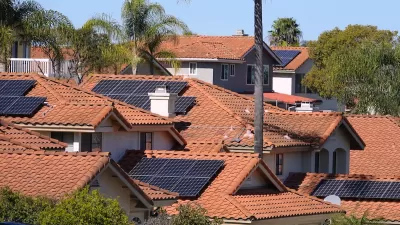With a set of 2020 affordability targets met three years early, the DOE can turn its attention to reliability, resilience, and storage.

Utility-grade solar panels have hit 2020 cost targets three years early, the U.S. Department of Energy announced. The average price is now 6 cents per kilowatt-hour. Karen Hao explains in Quartz:
"The steady decline in the price of solar power is largely due to falling costs of photovoltaic hardware, driven by market competition, as well as improvements in efficiency, in part stimulated by DOE-funded research, according to a report released by the National Renewable Energy Laboratory on the same day. 'Soft' costs like labor have also fallen, but at a slower rate."
Now, the DOE is moving on to other goals, beginning with an $82 million investment from its Solar Energy Technologies Office in reliability, resilience, and storage solutions. Hao's piece includes further analysis of solar affordability trends and the DOE's new projects.
FULL STORY: Solar is now so cheap in the US it beat government goals by three years

Planetizen Federal Action Tracker
A weekly monitor of how Trump’s orders and actions are impacting planners and planning in America.

Maui's Vacation Rental Debate Turns Ugly
Verbal attacks, misinformation campaigns and fistfights plague a high-stakes debate to convert thousands of vacation rentals into long-term housing.

San Francisco Suspends Traffic Calming Amidst Record Deaths
Citing “a challenging fiscal landscape,” the city will cease the program on the heels of 42 traffic deaths, including 24 pedestrians.

Amtrak Rolls Out New Orleans to Alabama “Mardi Gras” Train
The new service will operate morning and evening departures between Mobile and New Orleans.

The Subversive Car-Free Guide to Trump's Great American Road Trip
Car-free ways to access Chicagoland’s best tourist attractions.

San Antonio and Austin are Fusing Into one Massive Megaregion
The region spanning the two central Texas cities is growing fast, posing challenges for local infrastructure and water supplies.
Urban Design for Planners 1: Software Tools
This six-course series explores essential urban design concepts using open source software and equips planners with the tools they need to participate fully in the urban design process.
Planning for Universal Design
Learn the tools for implementing Universal Design in planning regulations.
Heyer Gruel & Associates PA
JM Goldson LLC
Custer County Colorado
City of Camden Redevelopment Agency
City of Astoria
Transportation Research & Education Center (TREC) at Portland State University
Jefferson Parish Government
Camden Redevelopment Agency
City of Claremont





























